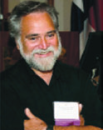ANCORA IMPARO BY RICK RADER, MD ■ EDITOR-IN-CHIEF
One of the most recent eponymous laws that Exceptional Parent magazine salutes, supports and applauds is Chloe’s Law (Down Syndrome Prenatal Education Act).
A physician, an engineer, and an attorney were discussing who among them belonged to the oldest of the three professions represented. The physician said, “Remember, on the sixth day God took a rib from Adam and fashioned Eve, making him the first surgeon. Therefore, medicine is the oldest profession.”
The engineer replied, “But, before that, God created the heavens and earth from chaos and confusion, and thus he was the first engineer. Therefore, engineering is an older profession than medicine.”
Then, the lawyer spoke up. “Yes,” he said, “But who do you think created all of the chaos and confusion?”
There are seemingly more jokes, scorn and dismay about lawyers than any other profession. But is it the lawyers or the “laws” that are the real culprits? Firstly, the sheer number of laws is unfathomable; in fact no one really knows the number of laws in the Federal code.
According to Matt Vespa writing in Townhall, “There are at least 5,000 federal criminal laws, with 10,000-300,000 regulations that can be enforced criminally. In fact, our entire criminal code has become a leviathan unto itself. In 2003, there were only 4,000 offences that carried criminal penalties. By 2013, that number had grown by 21 percent to 4,850. The code has become so big, that the Congressional Research Service and the American Bar Association simply do not have enough staff to adequately categorize every law we have on the books.”
So we got laws up the kazoo and continue to make new ones. We not only continue to make up new ones, we don’t rescind the dumb ones we made up in the past.
In Alaska it’s illegal to wake up a bear for a photo opportunity.
In Wisconsin it’s illegal to serve butter substitutes in state prisons.
In Connecticut a pickle is not officially a pickle unless it bounces.
While I feel sorry for those individuals who have to enforce these laws, I feel very sorry for those individuals who have had to come up with “names” for those laws.
It seems to make much more sense to “name” laws after the person that was responsible for the initiation of the law in the first place. Thus examples of these “eponymous laws” are:
• Lindberg Law (makes transporting a kidnapping victim across states lines a federal crime; named after the infamous Lindbergh kidnapping in the 1930’s).
• Tokyo Rose Statutes (forbids foreigners from owning more than 25 percent of any U.S. broadcaster; named after the infamous broadcasters of anti-American Japanese propaganda during World War II.)
• Kristen’s Law (named after Kristen Modafferi, an adult reported missing in North Carolina; her family couldn’t use any of the nation’s kidnapping resources to try to track her down because she wasn’t a child. The Act created a National Center for Missing Adults).
Then there are laws, theorems, principles, adages and other succinct observations or predictions named after a person. For instance:
• Dolbear’s Law: an empirical relationship between temperature and the rate of cricket chirping.
• Gall’s Law: a complex system that works is invariably found to have evolved from a simple system that worked.
• Niven’s Law: if the universe of discourse permits the possibility of time travel and of changing the past, then no time machine will be invented in that universe.
• One of the most insightful laws relates to the naming of laws and that is Stigler’s Law of Eponymy, which states that no scientific discovery is named after is original discoverer.
My favorite battery of eponymous laws aren’t actual legislative laws or even laws of nature; a more appropriate name would be “adages.”
• An example being Acton’s Law: “Power tends to corrupt; absolute power corrupts absolutely.”
• How about, Dykstra’s Law: “Everybody is somebody else’s weirdo.”
• Or Kitman’s Law, “Pure drivel tends to drive away ordinary drivel.”
• Napoleon’s Law, “Never interrupt your enemy when he is making a mistake.”
• Sinclair’s Law (named after Upton Sinclair, the Pulitzer Prize-winning author): “It is difficult to get a man to understand something, when his salary depends upon his not understanding it!”
• And of course you can take Thoreau’s Law to the bank: “If you see a man approaching you with the obvious intention of doing you good, you should run for your life.”
One of the most recent eponymous laws that Exceptional Parent magazine salutes, supports and applauds is Chloe’s Law (Down Syndrome Prenatal Education Act). This Pennsylvanian law requires health care providers to make a woman who receives the prenatal diagnosis of Down syndrome aware that they can receive a full range of factual and supportive information through the Pennsylvania Department of Health.
Information includes physical, developmental, educational and psychosocial outcomes as well as contacts for relevant resource centers, clearinghouses and support services. It was initiated by Kurt and Margie Kondrich in honor of their 15-yearold daughter, Chloe, who has Down syndrome. In an article in the Pittsburgh Post-Gazette Campbell North reported that, “Mr. Kondrich spearheaded the advocacy effort for the legislation after discovering that more than 90 percent of women terminate their pregnancy after receiving a prenatal diagnosis for Down syndrome.”
Chloe Kondrich joins Rosa Marcellino, another young girl with Down syndrome, in being the impetus for the passage of significant, long overdue and game changing laws; the laws that articulate the core values of an inclusive society. Readers of Exceptional Parent magazine will recall that Ms. Marcellino is the Rosa of “Rosa’s Law” that dropped the term mental retardation in 2010.
Among laws there are Twelve Immutable Universal Laws (which constitutes the basis for a doctoral thesis) the one “immutable universal law” that demonstrates the value of both Chloe and Rosa is “The Law of Divine Oneness,” where everything is connected to everything else. What we think, say, do and believe will have a corresponding effect on others and the universe around us.•

ANCORA IMPARO
In his 87th year, the artist Michelangelo (1475 -1564) is believed to have said “Ancora imparo” (I am still learning). Hence, the name for my monthly observations and comments.

— Rick Rader, MD, Editor-in-Chief, EP Magazine Director, Morton J. Kent Habilitation Center Orange Grove Center, Chattanooga, TN

